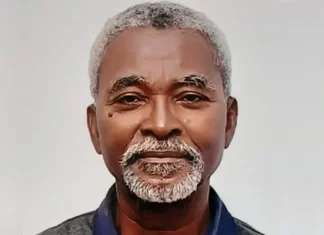The Angel, as a short story, deals with the theme of having knowledge of when one’s time comes to leave the planet earth.
By Lechi Eke
Still on Helon Habila’s collection of short stories, Waiting for an Angel, we focus on the one with the book title, The Angel. This short story is as brief as the life of its main character. But what makes it so literary naturalism is the angle the author chose to examine this unappealing event called death. The angle is the curiosity of the main character to have knowledge of the day of his departure. This is uncanny; a taboo.
The reader doesn’t get to know the name of the main character in the story. He narrates his story himself.
POV, Plot, theme, diction, characterisation, setting, structure
POV
It is written in the first-person point of view. However, I found fault with this POV because if a person is to die, another person should record it. Even in the book of Deuteronomy which is part of the Pentateuch that Moses is said to be the author, it is written in the third person omniscient POV in order to accommodate the recording of the death of the author.
Plot
The story opens with the main character sitting in a bar, waiting for his angel of death as he has let us know in the opening statement that it was his day to die. He says he knows it when he woke up that morning and saw a black crow croaking on his window ledge. A marabout he and his friends (Lomba and Bola) consulted had told him he would know when the time came.
READ ALSO:
So, we meet the main character sitting in an empty bar, except for the bartender. He is drinking Coke in a glass and its half-empty bottle sits in front of him. While there, he gives us a flashback on how this matter of waiting for an angel of death came about. He and his two friends had gone to Badagry, a coastal town in Lagos state where most of the slave trading in the western region of what is now called Nigeria took place, to the slave port. Dismayed by the sights and the guide’s explicit descriptions of how slave trading was conducted, Lomba suggests they abandon the tour and go instead to see an Islamic fortune teller, a marabout on the beach.
The seer tells Lomba that he sees prison for him. While this unnamed narrator’s desire of knowing when he’ll depart from the earth takes the marabout by surprise. However, he gives him his heart’s desire. He consults his magic and tells him that he will know when his time comes.
Now, fast-forward to the day he sees a black crow croaking on his window ledge when he woke up from sleep. He is the one who feels a certainty about that day; who chooses the place he thinks his death will occur. It’s a bar. While drinking a bottle of Coke in a glass and trying to figure out the form Israfael (Muslim name for angel of death) will take, he witnesses a jungle justice of a mob lynching a thief on the street.
The young thief while running from the mob, looks back and collides with an electric pole and falls down. His pursuers catch up with him, beat him senseless, pour petrol on him and set him ablaze.
Our narrator watches as the young thief does his macabre dance writhing with pains as the fire burns him and he’s sure his own time to go is just by the corner and processes in his mind how he’d like it to be, his going.
It begins to rain and many passers-by seek shelter in the bar. The place becomes crowded and many of them decide to catch the news. But the TV is not working, though they try different channels. Someone suggests the barman tune in to the radio. There and then, they find out that a coup has taken place.
The most crucial information they catch from the broadcast from one of the coup plotters is that there is a dusk to dawn curfew that starts from that day. No one should be seen on the road by 6pm. People begin to disperse leaving the bar in a hurry.
The narrator who is still waiting for Israfael, stays put in the bar drinking his Coke wondering what form the angel will take, or if he has missed the venue. The barman says he’s closing, our narrator says he’s waiting for a ‘friend’, and that he gave him ‘this address’. The barman points out that his friend may not come because of the curfew.
At that moment, the bar door is kicked open and two soldiers come in, their guns slung on their shoulder. They order drinks and tell the narrator to go home. He refuses saying that he’ll leave by 6pm, he still has time. One of the soldiers is infuriated and goes to him and knocks over his bottle of Coke and the glass. They fall down and break.
The narrator, who’s still wondering if it’s the short or the tall soldier who’s Israfael since angels can take any form they want, flip the table over and knocks the soldier to the floor of the bar and begins to run away. The other soldier shoots him, but before he dies (?), I have no idea, he sees Israfael spreads his enormous wings and sees himself shot in the chest and sees blood gushing out and life ebbing from him. Then, he sees a bird flies off. Story ends.
Theme
The Angel, as a short story, deals with the theme of having knowledge of when one’s time comes to leave the planet earth. This knowledge of course, employs dreams, guessing, feeling, superstition, etc…
Armed with the themes of literary naturalism, Habila weaves a tale as short as the short life he depicts in the story with taboos, determinism, and violence.
Determinism is presented as a theme through the presentation of the protagonist or main character seeing a croaking black crow on the ledge of his window one morning. This superstitious belief is in support of the belief that seeing black crows (especially close up) portends an omen.
The theme of violence is presented early in the short story in the scene where the young thief is lynched. And of course, also the theme of taboo is presented early in the story from the opening sentence when the main character who is the narrator says, “Today is the last day of my life.”
This theme is repeated again and again as he and his friends wander to the Badagry beach and seek out a marabout and the narrator asks for the day of his own death.
So, taboo as well as the other themes, especially, violence, run through the very short story.
Structure
The skeleton on which this story is built is not tight from the beginning. It would be tight if three friends went to a fortune teller to tell their fortune and the narrator, without request is told he’s about to die and is told he’s among the ‘blessed’ few who will know the time of their departure. But No, he asks for it! So, we have a loose structure here because his fortune isn’t told until he insists on it.
Again, he seems to be the one who killed himself if he actually did because I don’t know the bit about the bird flying out while he records the event. He is the one who picks a place, the venue for his death. He is the one who attacks an armed soldier, etc. It seems to me that he begs for it!
That he saw a black bird in the morning when he woke up croaking on his window ledge, has nothing to do with his picking a place to die and saying he’s waiting for a ‘friend’ and refusing to leave the bar when others were leaving, refusing to leave when armed soldiers arrive and tell him to go home on a night when a coup d’état took place and a curfew is imposed? He’s the one who attacked an armed soldier with a table!
Well, from the time he sits in that bar and does not leave when others did and challenged a soldier with gun, you can say there are some cause-and-effect actions going on. But these actions because they do not come from believable human responses to things that happen to them, I will not term the structure as tight. What I’m saying is that every day person doesn’t respond to the thought, fear, suspicion of death the way this young protagonist does.
Characterisation
I think the characterisation of a young university undergrad at 21 about to write exams is apt for someone who would be foolishly bold enough to be curious to know the day of his departure from earth.
Youth is an adventurous stage of life, and to be a university student is the height of intellectual pursuit. It depicts the age of inquisitiveness; of seeking knowledge which can get as bad as being curious to know one’s day of departure from planet earth.
The people in the story like the narrator’s two friends are like him, university students who seek knowledge hence, they go for a tour of a slave port. This characterisation is apt – young intellectuals seek more knowledge. Also, it is seeking knowledge (now, for the future) that takes them to a fortune teller.
The answers they receive affect them – Lomba becomes sombre. The reader can see that the narrator goes cuckoo.
Other characters are the mob. They behave like the mob. We see the influence of the mob on an individual – it reduces a young man to a mass of black soot.
We have the stock characters of the soldiers, the fortune-teller, those who sought shelter in the bar and the bartender.
Diction
Written in simple English, this short story boasts of apt words that tell of the themes of the story. For example, ‘…black crow croaking on my window ledge’; ‘danse macabre’; Angel of Death, Israfael, the mob on him, pour petrol on him and set him ablaze, etc.
On the fifth page of this six-paged short story, the main character uses the word ‘appointed’ which reminds the reader of the Bible passage in Hebrews 9:27 which says, “And as it is appointed unto man once to die, but after this the judgement.”
In all, Habila employed concrete words in his tale.
Setting
The short story is set on a beach, in the street and in a bar. All three, public places that affect behaviours. Is the author thus suggesting, albeit, subtly, that the narrator’s environment affected his decisions or actions? The eerie mood is set by the words of the ‘unstable’ young man who clearly wants to die.













